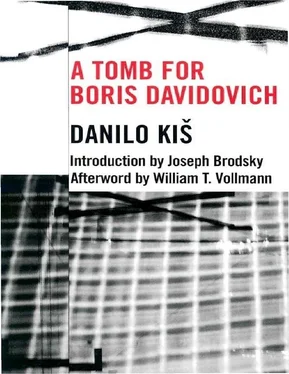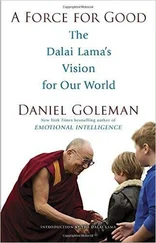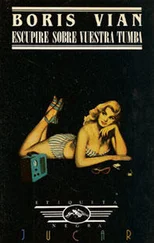Novsky thought that he knew this young man from somewhere. He had fair skin sprinkled with freckles, an unhealthy complexion, thick dark hair, and slightly crossed eyes; most likely he wore glasses, and it seemed to Novsky that he could even discern their marks still fresh on the bridge of his nose. The thought that this young man actually looked like himself some twenty years ago struck him as absurd, and he tried to discard it; nevertheless, for a split second he couldn’t help thinking that this resemblance (if real and purposeful) carried a certain risk for Fedukin’s interrogation, and could be regarded in some way as an error and a crack in Fedukin’s direction. But Fedukin must have sensed, too, that if this resemblance was purposeful and the result of his careful selection, then this notion of resemblance, of identity, would inevitably lead Novsky to realize the major difference; this resemblance would show him that he was killing men similar to himself, men whose role carried the seed of a future biography, consistent, well rounded, much like his own, but destroyed at the very onset, nipped in the bud, so to speak, by his own doing. By his stubborn refusal to cooperate with the inquiry, he would find himself (indeed, he already did) at the beginning of a long series of murders committed in his name.
Novsky felt the presence of Fedukin behind him, holding his breath and waiting in ambush for his thoughts, his decision, just as he felt the presence of the guards, who stood to one side with cocked guns, ready to commit murder by his hand. Fedukin's voice was calm, unthreatening, as if delivering the result of an entirely logical operation: "You'll die, Isaievich, if Novsky doesn't confess.” Before Novsky had a chance to say anything at all, before he had a chance to think of the shameful conditions of his surrender the young man sized him up with his nearsighted eyes, moved close to his face, and whispered to him in a voice that made Novsky shudder: “Boris Davidovich, don't let the sons of bitches get you!”
In that same instant two shots resounded almost simultaneously, though barely audible, as when a cork pops out of a champagne bottle. He could not help opening his tightly shut lids to verify his crime: again the guards had shot point-blank into the back of the neck, their barrels aimed up toward the skull; the young man's face was unrecognisable.
Fedukin left the cellar without a word and the guards took Novsky away and threw him on the stone floor. Novsky spent nightmarish hours in his cell, surrounded by rats.
The next evening, after the third shift of guards came on, he asked to see the interrogator.
That same night they transferred him from the stone cell to the prison hospital, where he spent some ten days, as if in a coma, under the watchful eyes of guards and hospital personnel, who were given the assignment of rebuilding out of these remnants a man worthy of that name. Fedukin knew from experience that men far less tough than Novsky became infused with an unsuspected strength when the moment beyond all limits was reached, and when the only issue was to die honorably: at the moment of dying they tried to derive from death the greatest possible gain by an obstinate resolution, which, perhaps because of physical exhaustion, was most often reduced to heroic silence. Practice had also taught him that the restored functioning of the organism, normal blood circulation and the absence of pain, gave convalescents and former death candidates a certain organic conformity, which caused as a consequence, paradoxical as it seems, the weakening of the will and the ever-decreasing need for heroic bravado.
In the meantime, the accusation that Novsky had belonged to a spy network for the British was dropped, especially after the unsuccessful confrontation with Reinhold. (British trade unions contributed greatly to this, by making a loud noise in the European press about Novsky's arrest and by denouncing as entirely unfounded and absurd accusations that appeared in the official press: the rendezvous in Berlin with a certain Richards, who had allegedly bribed Novsky, like Judas, with thirty pieces of silver, was refuted by the perfect alibi of the said Richards: on that day he was attending the trade union conference in Hull.) This awkward intervention by the trade unions placed before the investigators the none-too-easy task of proving the accuracy of their claims, in order to save their reputation on a much wider international plane.
The negotiations lasted from February 8 to 21. Novsky prolonged the inquiry, trying to incorporate into the confession-probably the only document of his that would remain after his death-a certain wording that would not only cushion his final downfall but also whisper to a future investigator, through the skillfully woven contradictions and exaggerations, that the whole structure of this confession rested on a lie squeezed out of him by torture. This was why he fought with unsuspected strength for every word, every phrase. For his part, Fedukin, no less resolute and cautious, made maximal demands. Through long nights the two men struggled over the difficult text of the confession, panting and exhausted, their heads bent over the pages enveloped in the thick cigarette smoke, each trying to incorporate into it some of his own passion, his own beliefs, his own outlook from a higher perspective, Fedukin knew just as well as Novsky (and let him know it) that all this-the entire text of the confession, formulated on ten closely typed pages — was pure fiction, which he alone, Fedukin, had concocted during the long hours of the night, typing with two fingers, awkwardly and slowly (he liked to do everything himself), trying to draw logical conclusions from certain assumptions. He was therefore not interested in the so-called facts or characters, but in those assumptions and their logical use; in the final analysis his reasons were the same as Novsky's, when Novsky, starting from another premise, ideal and idealized, rejected any assumption beforehand. Lastly, I believe that both acted from reasons that transcended narrow egocentric goals: Novsky fought to preserve in his death and downfall the dignity of not only his own image but also that of all revolutionaries, while Fedukin, in his search for fiction and premises, strove to preserve the sternness and consistency of revolutionary justice and of those who dispense this justice; for it was better that the so-called truth of a single man, one tiny organism, be destroyed than that higher interests and principles be questioned. If, in the later stages of interrogation, Fedukin lunged at his obstinate victims, this was not the whim of a neurotic or a cocaine addict, as some believe, but a struggle for his convictions which, like his victims', he considered to be altruistic, inviolable, and sacred. What provoked Fedukin's fury and dedicated hatred was precisely this sentimental egocentricity of the accused, their pathological need to prove their own innocence, their own little truths, this neurotic going around in circles of so-called facts encompassed by the meridians of their skulls. It enraged him that this blind truth of theirs could not be incorporated into a system of higher value, a higher justice which demanded sacrifice, and which did not and must not care about human weakness. This was why for Fedukin anyone became a blood enemy who could not comprehend this simple and almost obvious fact: to sign a confession for the sake of duty was not only a logical but also a moral act, and therefore worthy of respect. Novsky's case was all the more defeating for him since he respected Novsky as a revolutionary and, for a period of time some ten years ago, had regarded him as a model. That day in the cattle car on the siding of the Suzdal railroad station, he had, despite everything, approached him with due respect for his person and in full confidence. Since then, however, he had experienced a disillusionment that had entirely destroyed in his eyes the myth of a revolutionary: Novsky could not understand that his own egocentricity (surely a product of flattery and praise) was stronger in him than his sense of duty.
Читать дальше









